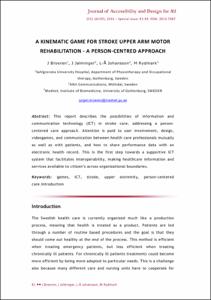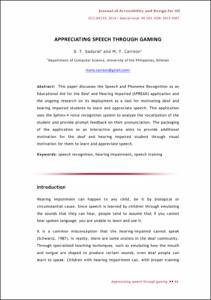2014, vol. 4, núm. 2
Sumari
-
Agile development of a virtual reality cognitive assessment

(Càtedra d'Accessibilitat (CATAC), 2014-07)
(Càtedra d'Accessibilitat (CATAC), 2014-07)
Article
Accés obertIn recent years user-centered design, participatory design and agile development have seen much popularity in the field of software development. More specifically, applying these methods to user groups with cognitive and ... -
Telerehabilitation for stroke patients: an overview of reviews

(Càtedra d'Accessibilitat (CATAC), 2014-07)
(Càtedra d'Accessibilitat (CATAC), 2014-07)
Article
Accés obertBackground: The increasing number of survivors following stroke events are enlightening new needs to guarantee appropriate care and quality of life support at home. A potential application of telemedicine is to provide ... -
A kinematic game for stroke upper arm motor rehabilitation - a person centred approach

(Càtedra d'Accessibilitat (CATAC), 2014-07)
(Càtedra d'Accessibilitat (CATAC), 2014-07)
Article
Accés obertThis report describes the possibilities of information and communication technology (ICT) in stroke care, addressing a person-centered care approach. Attention is paid to user involvement, design, videogames, and communication ... -
Appreciating speech through gaming

(Càtedra d'Accessibilitat (CATAC), 2014-07)
(Càtedra d'Accessibilitat (CATAC), 2014-07)
Article
Accés obertThis paper discusses the Speech and Phoneme Recognition as an Educational Aid for the Deaf and Hearing Impaired (SPREAD) application and the ongoing research on its deployment as a tool for motivating deaf and hearing ... -
Web-based home rehabilitation gaming system for balance training

(Càtedra d'Accessibilitat (CATAC), 2014-07)
(Càtedra d'Accessibilitat (CATAC), 2014-07)
Article
Accés obertCurrently, most systems for virtual rehabilitation and motor training require quite complex and expensive hardware and can be used only in clinical settings. Now, a low-cost rehabilitation game training system has been ... -
A virtual reality exposure therapy for PTSD patients controlled by a fuzzy logic system

(Càtedra d'Accessibilitat (CATAC), 2014-07)
(Càtedra d'Accessibilitat (CATAC), 2014-07)
Article
Accés obertThis paper describes the main characteristics of two integrated systems that explore Virtual Reality technology and Fuzzy Logic to support and to control the assessment of people with Post-Traumatic Stress Disorder during ... -
Camera-based software in rehabilitation/therapy intervention

(Càtedra d'Accessibilitat (CATAC), 2014-07)
(Càtedra d'Accessibilitat (CATAC), 2014-07)
Article
Accés obertUse of an affordable, easily adaptable, ‘non-specific camera-based software’ that is rarely used in the field of rehabilitation is reported in a study with 91 participants over the duration of six workshop sessions. ...








